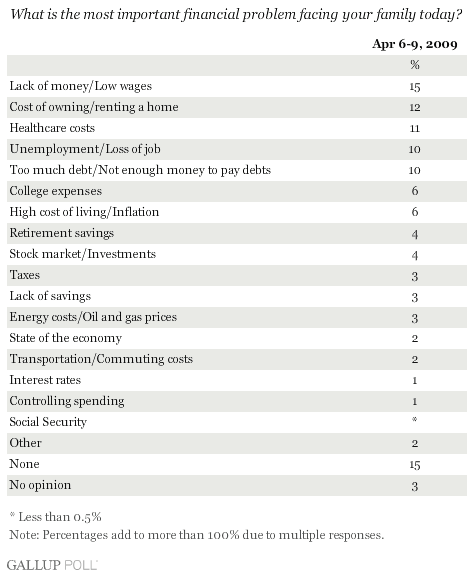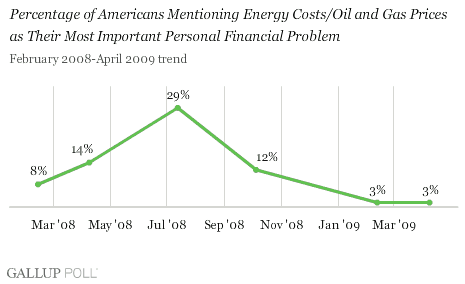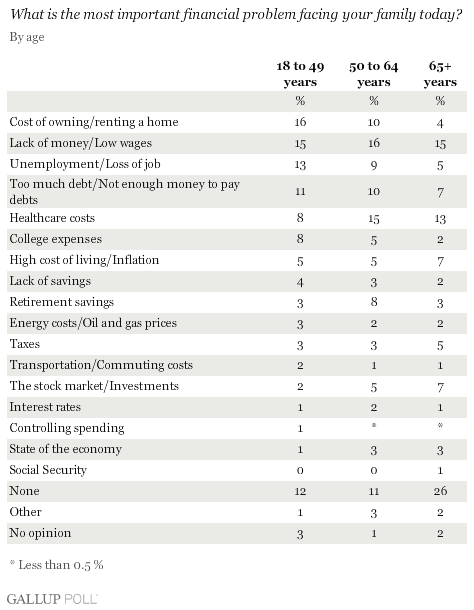PRINCETON, NJ -- Americans today are worried about a wide variety of personal financial problems, rather than -- as has been the case within the past year -- indicating high levels of worry about one or two specific problems. The top problems Americans name when asked about the most important financial problem facing their families include "lack of money" (15%), the cost of owning or renting a home (12%), healthcare (11%), jobs (10%), and too much debt (10%).

The biggest change over the last year in Americans' views of their personal financial problems has come in the ebb and flow of concerns about energy prices and inflation.
Last July, with gas prices hovering at $4 a gallon or more in most places across the country, 29% of Americans said their biggest financial problem was the cost of gas, followed by another 18% who said it was the high cost of living. Now, with gas prices having settled back down to around $2 a gallon, only 3% of Americans name gas prices as their No. 1 financial problem, and just 6% mention inflation.

No single specific financial problem has come forward to take the place of gas prices in the current economic climate. Rather, Americans appear to have a diffuse set of issues -- the most prevalent of which revolve around the simple lack of money.
It is not surprising to find some differences by age in perceptions of financial problems.

For Americans under age 50, the top personal financial problems according to the current survey are:
-
The cost of owning or renting a home (16%)
-
Lack of money (15%)
-
Jobs (13%)
For those 50 to 64, jobs do not register as one of the top problems. Instead, the top problems are:
-
Lack of money (16%)
-
Healthcare costs (15%)
-
Not enough money to pay debts, and the cost of housing (10% each)
For those 65 and older, housing is not much of a perceived problem at all, nor are jobs. Seniors are proportionately more concerned about the stock market and inflation.
-
Lack of money (15%)
-
Healthcare costs (13%)
-
Stock market, inflation, and debts (all at 7%)
There are significant differences in perceptions of personal financial problems by income.
The top three problems for those making $75,000 a year and more are:
-
College expenses (14%)
-
Cost of housing (11%)
-
Retirement (9%)
The top issues for middle-income households (those making between $30,000 and $74,999 a year) are:
-
Jobs (14%)
-
The cost of housing, healthcare costs, and not enough money to pay debts (11% each)
For low-income households (those making less than $30,000 a year), the top problems are overwhelmingly focused on the simple fact of not having enough money:
-
Lack of money (22%)
-
Not enough money to pay debts (16%)
-
The cost of housing (15%)
Implications
The Obama administration and Congress continue to face the daunting challenge of fixing the nation's financial problems -- and in so doing, to help jump-start consumers' willingness to increase their spending and other economic activity. The data from Gallup's annual Economy and Personal Finance poll reviewed here show there is no single silver bullet that is likely to bolster Americans' personal financial optimism. When asked to name the most important personal financial problem facing their families, Americans offer up a wide variety of concerns -- most of which stem from the obvious and simple fact that they do not have enough money.
The percentage of Americans who specifically tell Gallup interviewers that jobs are the most important problem is relatively small (10%). Likewise, just 12% of Americans mention the burden of housing costs, and 11% mention healthcare costs. Each of these has been or will be the focus of specific programs aimed at alleviating Americans' financial concerns. Fixing each of these may in fact ultimately have a salutary effect on Americans' overall economic angst, yet none of them appears to be a cure-all.
Survey Methods
Results are based on telephone interviews with 1,027 national adults, aged 18 and older, conducted April 6-9, 2009. For results based on the total sample of national adults, one can say with 95% confidence that the maximum margin of sampling error is ±3 percentage points.
Interviews are conducted with respondents on land-line telephones (for respondents with a land-line telephone) and cellular phones (for respondents who are cell-phone only).
In addition to sampling error, question wording and practical difficulties in conducting surveys can introduce error or bias into the findings of public opinion polls.
